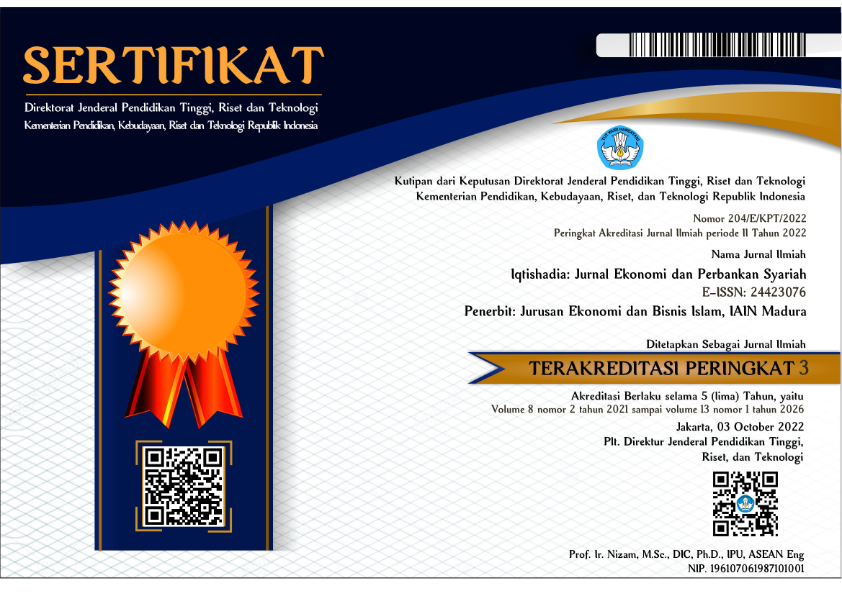Application of Fiqh Principles in Shopee E-Commerce On the Shopee Barokah Feature in Abbas Arfan's Thoughts
 Abstract views: 204
,
Abstract views: 204
,
 PDF downloads: 150
PDF downloads: 150
Abstract
According to Musthafa al-Zarqa, Qawaidul Fiqhiyah are the basics of general and concise fiqh in the form of laws containing general sharia laws regarding various legal events that fall within the scope of these rules. The benefit of having qawaidul fiqhiyah is to provide more practical guidance derived from the text and spirit of the original text, namely the Koran and Al Hadith, which were generalized very carefully by previous scholars by paying attention to various fiqh cases that have occurred, so that the results are now easy to apply to the public. wide. Fiqh rules are not only used in ubudiyah, but in the muamalah kulliyah aspect there are also fiqh rules. The application of fiqh rules follows the development of economic transactions, one of which is at Shopee Barokah. With qualitative research methods and a descriptive approach, analysis and data collection uses the five principles of jurisprudence by Dr Abbas Arfan. The results of this research are that shopee barokah is in accordance with the five principles of fiqh, including the principles of Taba'dul al-Mana'fi in the Islamic transaction menu, the principles of equality and justice in the ZISWAF menu and shopee sharing food, the principles of pleasure and consent in every transaction at shopee barokah, the principle of honesty in the menu of halal raw materials and halal shopee food, as well as the principles of goodness and piety in the Qibla menu, prayer schedules and the Qur 'an
Keywords: Shopee Barokah, Contemporary Fiqh Rules, Economic transactions
Downloads
References
Aghestia Marinda Monica, Islamic Law Analysis of Shopee Pay Later Electronic Money Loans in E-Commerce, UIN Sunan Ampel Thesis, 2020.
Al-Sayid, MA (1996). Tafsir verse al-Ahkam, Bayrut: Dar al-Fikr.
Andiko, T. (2011). Qawaid Fiqhiyyah Science: A Practical Guide in Responding to Islamic Legal Problems, Yogyakarta : Terrace.
Arfan, A. (2013). 99 Muamalah Kulliyah Fiqh Rules, Malang: UIN Maliki Press.
Dahlan, AR (2011). Ushul Fiqh. Jakarta: Amzah
Djazuli, A. (2006). Fiqh Rules: Islamic Law Rules in Resolving Practical Problems, Jakarta: Kencana.
Laili Nur Hidayati, The Influence of Viral Marketing, Online Consumer Reviews and Prices on Shopee Purchasing Decisions in Surabaya, JPTN: Journal of Constitutional Education, Vol 06 No 3, pp 77-84.
Permana Iwan, Application of Fiqh Rules in Economic Transactions in Sharia Financial Institutions, TAHKIM: Journal of Islamic Civilization and Law, Vol 3 No 1, pp 17-37
Pratama Gama, Analysis of Online Buying and Selling Transactions via the Shopee Marketplace Website According to Business Concepts During the Covid 19 Pandemic, ECOPRENEUR: Journal of Islamic Economics and Business, Vol 1 No 1, pp 21-34
Septiana Eka Sulistiawati, Widiyani Anna, Shopee Marketplace as a Sales Promotion Media for MSMEs in Blitar City, COMPETITIVE: Marketing Journal, Vol 04 No 1, pp 133-142, 2020.
Sulistiani, SL (March, 2018). Comparison of Islamic Law Sources, TAHKIM, Journal of Civilization and Islamic Law. Vol. 1, No. 1, Pg 114.
Survey .
https://help.shopee.co.id, Shopee Barokah, accessed on October 10 2023 at 09.45 WIB
https://www.djkn.kemenkeu.go.id, accessed on October 10 2023 at 09.30 WIB
https://independent.academia.edu/AbbasArfan/CurriculumVitae, accessed on Thursday November 16, 2023 at 20.00 WIB.
The journal operates an Open Access policy under a Creative Commons Non-Commercial Share-Alike license. All articles published Open Access will be immediately and permanently free for everyone to read and download.
• Creative Commons Attribution-NonCommercial (CC-BY-NC)

Iqtishadia: Jurnal Ekonomi dan Perbankan Syariah by http://ejournal.iainmadura.ac.id/index.php/iqtishadia is licensed under a Creative Commons Attribution-NonCommercial 4.0 International License.
Based on a work at http://ejournal.iainmadura.ac.id.

























